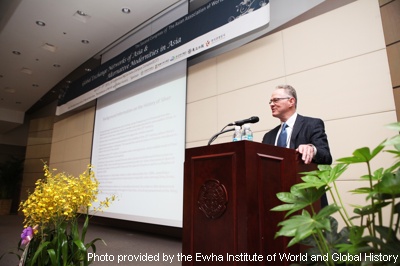
This event gathered 160 domestic and foreign scholars from 20 countries to re-evaluate the importance of Asian history and its significance in world history.
The AAWH is a representative association of Asian history in the field of world history and its congress is held every three years.
After the first congress was held in Osaka, Japan, in 2009, professor Cho Ji-hyung (History), one of the founding members and the current Executive Secretary of the AAWH, successfully brought the second congress to Seoul at the Board of Directors meeting in Amsterdam, Netherlands in 2008.
“By hosting the Second Congress of the AAWH at Ewha, I hoped to raise the global acknowledgement of both Ewha and Seoul, and also give a boost to the domestic research on world history and global history,” Cho said.
The opening ceremony on April 27 announced the start of the congress and three keynote addresses from Lee Tae-jin, the president of the National Institute of Korean History; professor Dennis Flynn from the University of the Pacific; and scholar Aril Dirlik were given on this day.
The day closed with a welcoming feast for all the participating scholars.
The remaining 35 panel speakers gave their speeches on the second and third day of the congress, and a general assembly of all the participants closed off the entire program on April 29.
Through the first topic, “Global Exchange Networks of Asia,” scholars shed light on Asia before the 1850s, when it had an absolute advantage over the European countries due to its domination of a considerable part of world trade.
The second topic “Alternative Modernities in Asia” allowed a closer look at Asia’s modernization and modernity after the 19th century from various perspectives and conditions.
“The Second Congress of the AAWH gave scholars an opportunity to observe history from an Asian point of view, away from the traditional Eucentrism perspective,” Cho said.
“Historians on Asian history were able to strengthen the Asian eye and build trust among each other by discussing and researching history together.”
Founded by professor Shingo Minamizuki from Hosei University in 2008, the AAWH seeks to “advance research, teaching, and public discussion on world historical studies in or for the Asian region.”
The AAWH is currently under close cooperation with various history associations, such as the World History Association and African Network in Global History. As the next International Congress of Historical Sciences will be held in China in 2015, the AAWH is expected to contribute greatly to the topics concerning world and global history.
Chung Yoon-young
yychung@ewhain.net

